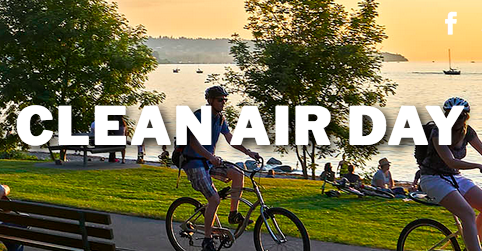Clean Air Day Minigrants
The Coalition for Clean Air organizes an annual Clean Air Day to bring attention to and educate people about air quality issues throughout California. This year the event will take place on October 5, and so far over 250 organizations have pledged to participate.
The Coalition is offering minigrants up to $1k to help organizations create events or otherwise engage people to take action on cleaner air. Examples of events they've funded in the past include art projects, transit parties, tree plantings, bike rides, no-idling campaigns, and open street events.
There are a few requirements: events should take place close to October 5, and should foster partnerships between different types of organizations, including schools and government agency, health care providers, nonprofits, and business organizations.
Applications are due by August 10 at 5 p.m.
While you're there, take the pledge for your organization to support Clean Air Day - and then hold them to it.
Weigh in on Climate Research Topics
The Governor's Office of Planning and Research is asking for input on California-specific climate research topics as part of its Fifth Climate Change Assessment, currently underway.
Give input via a survey with open-ended questions. The survey asks participants to identify gaps in climate change knowledge, and to help identify existing research or analysis that could be useful.
It also asks what types of tools or other resources should be included in the assessment, including visualizations of impacts, types of documents, and the like.
There also is room for whatever additional thoughts you may have on the topics.
Funding for Community Resilience Centers
The California Strategic Growth Council has just launched a new program to develop Community Resilience Centers (CRC) throughout the state.
This was made possible by the state budget surplus, which included $100 million specifically for this program as part of its climate investments.
The CRC "will fund new construction and upgrades of neighborhood-level resilience centers to provide shelter and resources during climate and other emergencies, such as extreme heat events and poor air quality days. The program will also fund year-round services and ongoing community amenities and programming, such as food distribution and workforce development training, that build overall community resilience. SGC will prioritize community-serving locations across the state, such as schools, libraries, community centers, health clinics, and places of worship."
$25 million will be made available in the first round of funding, with a call for applications expected in early 2023.
A kickoff webinar took place Friday morning to discuss eligible activities and program requirements before guidelines are drafted. Although it's over now, a recording will be posted to the SGC website, and more "listening sessions" are planned to help formulate the program based on priority needs.
On July 19 and 20, a session for the general public is planned. There will also be a session focused on rural communities on July 21; and another for tribal organizations on July 20.






